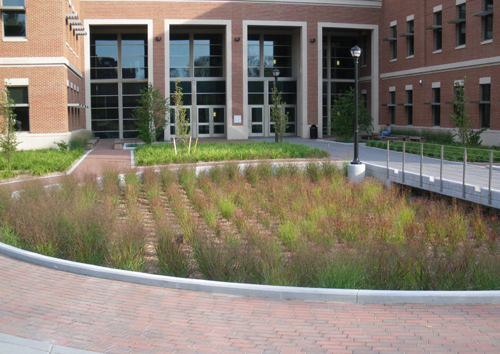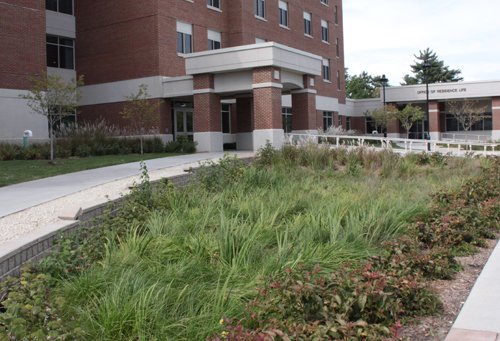Posted 2:45 p.m. Thursday, Sept. 20, 2012
 [/caption]Newly installed storm water management technology on campus is keeping the La Crosse area cleaner and improving environmental conditions for wildlife.
UW-L’s new Centennial Hall, Eagle Hall and the parking ramp under construction all have the latest in storm water runoff technology, including bio-infiltration units and catch basins. These and other updates on campus improve the quality of storm water runoff, says Dan Sweetman, UW-L’s environmental health, occupational safety and sustainability program manager.
Runoff is rain or snowmelt that runs off the land or hard surfaces like roads, roofs and parking lots into a river, marsh or other waterways. Storm water can carry with it fertilizer, oil, pesticides, detergents, pet waste, grass clippings and other pollutants. Once in the storm water, the pollutants can harm the natural environment.
“Runoff can carry contaminants into waterways, leading to depleted oxygen levels in the water and potential fish kills,” explains Sweetman. “We prefer to catch any of those contaminants prior to allowing them to get into the waterway.”
[caption id="attachment_15133" align="alignleft" width="500" caption="Bio-infiltration basins are on the east, west and south sides of Eagle Hall."]
[/caption]Newly installed storm water management technology on campus is keeping the La Crosse area cleaner and improving environmental conditions for wildlife.
UW-L’s new Centennial Hall, Eagle Hall and the parking ramp under construction all have the latest in storm water runoff technology, including bio-infiltration units and catch basins. These and other updates on campus improve the quality of storm water runoff, says Dan Sweetman, UW-L’s environmental health, occupational safety and sustainability program manager.
Runoff is rain or snowmelt that runs off the land or hard surfaces like roads, roofs and parking lots into a river, marsh or other waterways. Storm water can carry with it fertilizer, oil, pesticides, detergents, pet waste, grass clippings and other pollutants. Once in the storm water, the pollutants can harm the natural environment.
“Runoff can carry contaminants into waterways, leading to depleted oxygen levels in the water and potential fish kills,” explains Sweetman. “We prefer to catch any of those contaminants prior to allowing them to get into the waterway.”
[caption id="attachment_15133" align="alignleft" width="500" caption="Bio-infiltration basins are on the east, west and south sides of Eagle Hall."] [/caption]The technology also helps UW-L be in full compliance with U.S. Environmental Protection Agency and Wisconsin Department of Natural Resources storm water requirements.
“Facilities, Planning and Management will continue taking actions that improve storm water quality, but in the end, water quality on campus and in the region can only be protected and improved with help from the campus community,” says Sweetman. “Every person making an active commitment to environmental sustainability makes a difference.”
Consider strategies such as proper disposal of toxic chemicals, washing your vehicle at a car wash or using environmentally friendly detergent, and not dumping anything down a storm drain — even organic materials such as grass clippings or leaves.
Find more strategies in the UW-L "Doing Your Part" guidelines. As part of FP&M’s commitment to sustainability, documents related to UW-L’s Storm Water Management commitment are available at http://www.uwlax.edu/ehs/storm_water.htm.
For additional information related to UW-L’s storm water pollution prevention program or to report one-time or ongoing issues that could negatively impact storm water quality, contact Sweetman at 785.6800.
[/caption]The technology also helps UW-L be in full compliance with U.S. Environmental Protection Agency and Wisconsin Department of Natural Resources storm water requirements.
“Facilities, Planning and Management will continue taking actions that improve storm water quality, but in the end, water quality on campus and in the region can only be protected and improved with help from the campus community,” says Sweetman. “Every person making an active commitment to environmental sustainability makes a difference.”
Consider strategies such as proper disposal of toxic chemicals, washing your vehicle at a car wash or using environmentally friendly detergent, and not dumping anything down a storm drain — even organic materials such as grass clippings or leaves.
Find more strategies in the UW-L "Doing Your Part" guidelines. As part of FP&M’s commitment to sustainability, documents related to UW-L’s Storm Water Management commitment are available at http://www.uwlax.edu/ehs/storm_water.htm.
For additional information related to UW-L’s storm water pollution prevention program or to report one-time or ongoing issues that could negatively impact storm water quality, contact Sweetman at 785.6800.
